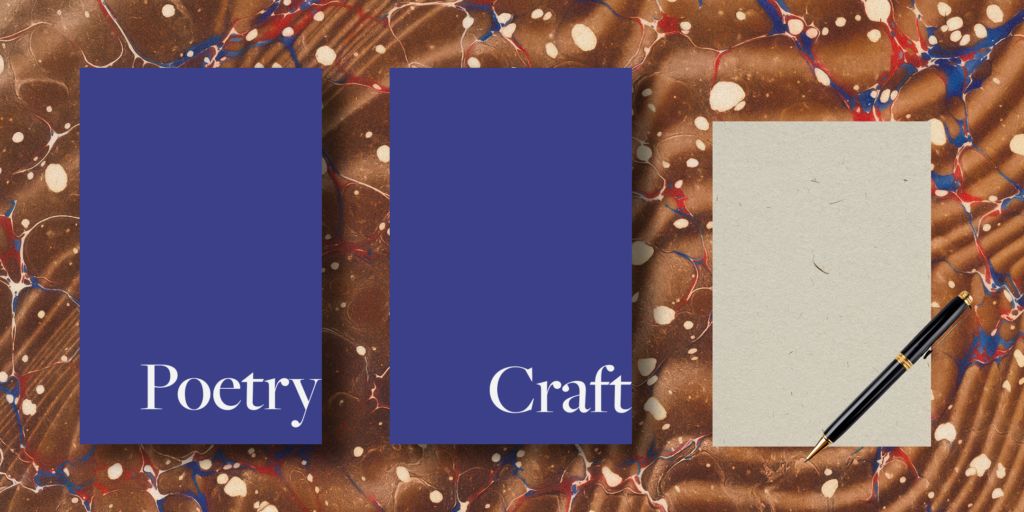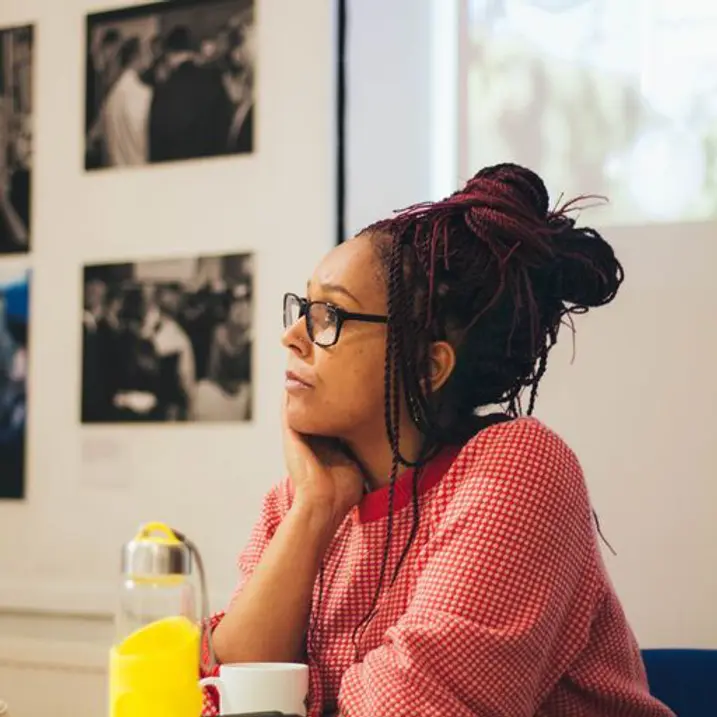As part of our Poetry Craft series, Louisa Adjoa Parker discusses how to support global majority writers in a demanding literary landscape through poetry.

What are some craft strategies you use to elevate personal or political content into work that also speaks artistically or universally?
I am very much what I describe as an ‘intuitive writer’! Which means writing poetry for me, is very much working with whatever comes out of my mind and lands on the page with a splat. I haven’t formally studied creative writing, so the techniques I use are the ones I’ve learned along the way. I don’t plan poems in the way I’d plan a story or an essay, and my poems are very much from the heart, without meaning to sound cheesy. For me it’s about the inspiration, the seed that plants itself inside my mind that grows and becomes a burning desire to write about a thing, and then I put pen to paper, fingers to keyboard, and see what comes out. Then it’s about the redrafting and editing – taking some time in between to let the poem sit and breathe. I love nature metaphors and I love writing in a way that feels accessible to all and isn’t academic or exclusive. If I’m writing about ‘race’ for instance, I hope there will be something there that resonates with people who’ve experienced being racially minoritised, as well as those who haven’t. I think most poets’ work is both personal and political! Every poet is unique and will find their own strategies to support their writing.
How can poets use techniques like form, tone, or metaphor to engage with themes of race, migration, or identity without being limited by them?
This is a tricky one to answer – there’s no ‘right’ way of talking about potentially difficult topics. I’d say to not overthink this, use whichever techniques feel right, and seem to fit the themes. I’d also say to try and add some lightness, some joy, some hope, even in the most difficult or traumatic stories, if that feels possible, because it might not always feel OK. Maybe even add some humour! You are only as limited as your imagination allows you to be. Write from your heart, the fire that burns inside you. You can tidy up and shape poems and consider form, tone, and metaphor as you go or when that burning desire to get words on the page has been sated. It’s also incredibly important to read widely about the themes that interest you, in all genres – this will inform your poetry and techniques will seep in through this practise. An ongoing chain of art inspiring art.
In what ways might poetry challenge dominant narratives around rural Britain and who is “seen” to belong there?
Ooh, well, there are lots of poets and writers, myself included, who are currently doing this and it is very exciting! As well as poets, there are others writing in academia, writing essays, stories, or ‘hidden’ histories. There are many pockets of work across the country which tell the stories – past and present – of some of the Global Majority Heritage and other minoritised people who live or have lived in rural spaces. This all appears to be part of a wider decolonising, anti-oppression movement to make space for a range of voices from groups including ‘race’, class, women, disabled people, and LGBTQ+ people. I always aim to offer a range of diverse perspectives on rural Britain and nature in my workshops – this is something we can all try to do. There is a lot going on in Nature Writing, as a genre, which is increasingly making space for exciting new voices. We can consciously seek out these diverse stories, read the anthologies of essays, such as Gathering: Women of Colour on Nature, or poetry, such as Out of Bounds, and follow the writers’ journeys. We can build our ‘toolkits’ of diverse writers over time and have conversations with others about the importance of this work. We can look at our unconscious bias and challenge stereotypes and myths wherever we find them, which includes inside our own heads.
How can Global Majority poets develop work that resists being reduced to biography, while still drawing power from lived experience?
I think we all draw from lived experience as writers and poets, whether we are writing about ourselves, others, or place. I don’t think there’s anything wrong, per se, with being ‘reduced to biography’ as poets tell the stories and find the words others can’t, of what it means to be human, and we offer something – even a glimpse – which helps us to make sense of the world. We can find ways to tell others’ stories if we don’t wish to directly write about our own experiences. Some of my favourite work as a writer has been inspiring or supporting others to tell their stories, or attempting to tell them myself. We can step outside of our own experience and step into someone else’s shoes, write observational poetry. But essentially, it is the lived experience, usually, that causes us to want to write in the first place, so I don’t think we need to be ashamed of that.
What does it mean to write about place, land, nature, or memory in a way that centres joy or resilience alongside grief or injustice?
Another tricky one! We don’t have to centre joy or resilience in the first instance. That’s not a rule, although I know many are critical of so-called ‘trauma porn’. When I started writing poetry I was understandably traumatised by my lived experience of racist Britain in the 1970s, 80s (and ongoing at a lower level). So, I spoke to that. I had a weird relationship with place at this point, because I didn’t feel accepted or that I belonged. However, it was through writing that I began to feel I do belong in the countryside – it is my home, and anyone who lives there also has the right to feel they belong. Writing about grief was a similar journey – to write from a place of loneliness and heartbreak, and then to more consciously focus on the beauty within grief – the memories of a friend I loved deeply, the connections with nature that helped me feel connected to the person I lost. I began to focus more on nature writing and came to believe that anyone can be a nature writer – we don’t have to be an expert. I began adding more light to my poetry (I hope!) to balance the darkness and to remind myself and others that us humans are resilient, and there are always moments of joy to be found.
How can the poetry world better support Global Majority writers in developing their craft without overburdening them with expectations, or the labour of addressing representation?
I could write an essay on this, and perhaps I will! Firstly, we need to make space for Global Majority writers to write about whatever we want to write about! There should be no expectations placed on anyone. We might want to write about racism or intersectional discrimination on the micro or macro level, war, grief, trauma, abuse, or we might want to write about kittens, flowers and rainbows. It’s really up to us! We are people, just like anyone else, with a plethora of interests, experiences, and stories to tell. Most stories contain something that resonates with readers, even if they haven’t had the same experience as the writer, there is common ground to be found. I do think we need more support, though (on a practical, financial, emotional level) because it is still more challenging to get published, and be a ‘successful’ writer (whatever that means!). We often have multiple, intersectional barriers, and ongoing hurdles to jump over, so we need an approach that focuses on equity, justice, and healing, not equality and box-ticking. We might need more financial support to be able to make the space to write, for example. And we definitely need to be paid for our work, at all times, fairly, and in a timely fashion. There is also the emotional labour of our work to be considered – it ‘costs’ us more to produce and share some of our work than it might for more privileged members of society. I would love to feel really supported and valued by all the people I work with or write for, but sadly we aren’t there yet.
Louisa will be running her Online course Global Majority Writing from the British Countryside: A Poetry Masterclass with us this with us this Autumn, starting on 23 September. To secure your place please visit the course page.

Louisa Adjoa Parker is a writer and poet of English and Ghanaian heritage who lives in the Southwest. She draws on her intersectional lived experience to inform her work, and her focus is on telling the stories of marginalised voices. She has published four poetry collections, most recently How to wear a skin (Indigo Dreams) and She can still sing (Flipped Eye). Her debut short story collection, Stay with me, was published by Colenso Books. She has a memoir forthcoming with Little Toller Books.
Louisa’s poetry and prose has been widely published and anthologised. Her poem, ‘The Jewellery Maker’, is included in the AQA GCSE English Literature Worlds and Lives anthology. She has been highly commended by the Forward Prize; twice shortlisted by the Bridport Prize; commended by the National Poetry Competition; and won the US Virginia Faulkner Award for Excellence in Writing. She has performed her work at numerous venues and literary festivals and has delivered writing workshops to thousands of participants from a diverse range of backgrounds.
Louisa has written books, essays, and exhibitions exploring Black and ethnically diverse history in rural parts of the UK. As well as writing, she works as an equity, diversity and inclusion consultant, providing training and advice to various organisations on their inclusion journeys.
Add your Reply
You must be logged in to post a comment.